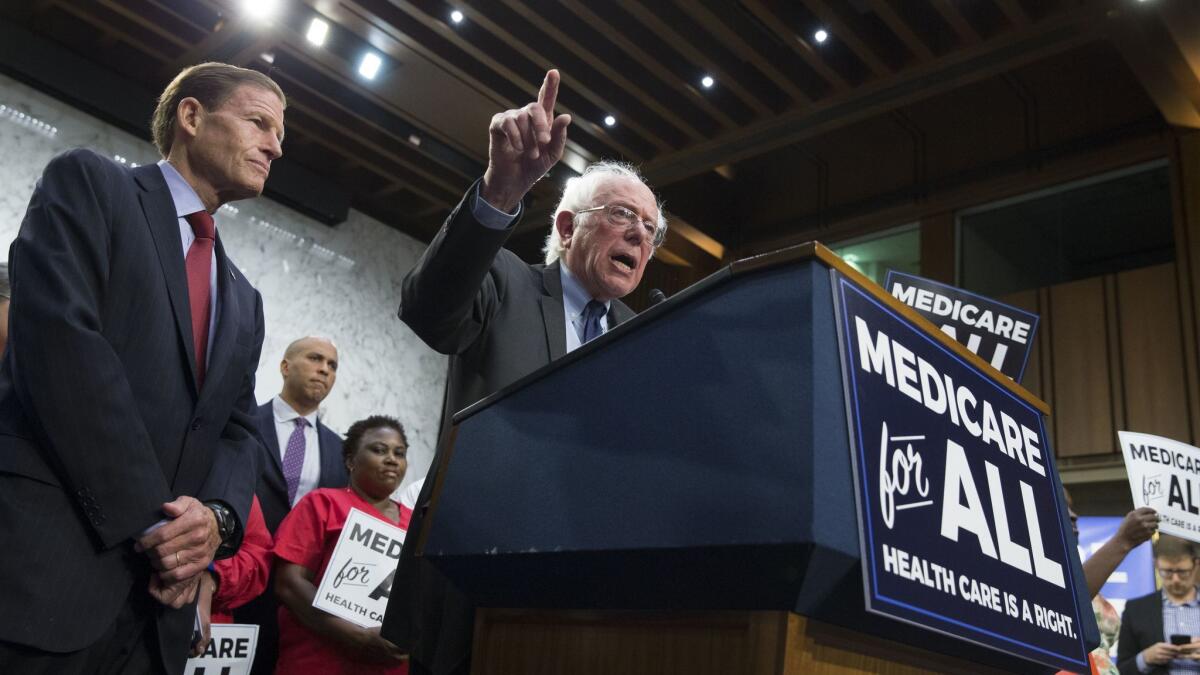Opinion: Having helped save Obamacare — maybe — Bernie now wants to kill it

As a clutch of Senate Republicans make a last-ditch effort to repeal the Affordable Care Act, a larger group of Senate Democrats started pushing its own alternative to Obamacare: expanding Medicare to all Americans, free of premiums and most out-of-pocket expenses.
The leader of this group, Vermont’s Bernie Sanders, is not actually a card-carrying Democrat. But his 15 co-sponsors are, including seemingly every Democratic senator with eyes on the White House.
Sanders’ vision is far different from the one laid out by Republican Sens. Lindsey Graham of South Carolina, Bill Cassidy of Louisiana, Dean Heller of Nevada and Ron Johnson of Wisconsin, who would collect all the money doled out through Obamacare in subsidies and additional Medicaid enrollments and hand it to states as a healthcare block grant that eventually goes away. But both proposals seem to be focused on the same issue: rising insurance premiums for people not covered by large employer health plans.
That’s unfortunate, because high premiums in the non-group market are just a symptom, not the real problem that the country has to address. The real problem is the unusually high cost of medical care in the United States.
How we approach that problem matters enormously, and this is one of the fatal flaws of Graham’s bill. The financial incentives throughout the healthcare system have to be turned upside down so that all participants are rewarded for keeping people healthy, rather than treating them when they’re sick. The more people who are uninsured, the harder it will be to move away from the wrong incentives that are ingrained in the current system toward the right ones. Graham’s bill almost certainly would result in millions more Americans going uninsured, given that it would eliminate Obamacare’s Medicaid expansion and reduce insurance subsidies for lower-income residents.
(The bill also would indefensibly redistribute federal aid from the states that chose to expand Medicaid to those that didn’t. In other words, it rewards the states that, out of hostility to the ACA, chose to leave many of their poorer residents uninsured, even when the federal government was picking up more than 90% of the tab.)
Sanders’ proposal, by contrast, would extend insurance coverage to all Americans. So it’s got that going for it. And unlike Graham’s bill, it doesn’t completely ignore the cost of medical care. Having doctors and hospitals deal with just one source of funding, rather than multiple public and private insurers, would save a bit of money and increase efficiency. But it wouldn’t do anything about the perverse incentives in the system — for example, hospitals still would need to fill their beds to make money.
The big stick Sanders would wield on healthcare costs is the threat (or promise, depending on your point of view) of federal price controls. Medicare determines how much to pay for care today in a relatively permissive way, basing its reimbursements on the recommendations of a panel of care providers. As a consequence, its rates bring more doctors and hospitals into the program than Medicaid, which requires only that states set their reimbursements high enough to ensure a minimum level of availability.
When states like California set Medicaid rates well below what other insurers pay — and even at times below the cost of providing treatment — doctors leave the program. With a Medicare for All approach, however, doctors wouldn’t have that option. They’d either have to accept what the government offers or confine themselves to seeing patients wealthy enough to pay for their care out of pocket. And it’s not clear how many patients would be willing to do that, considering how much they’d be paying in taxes to support Medicare for All.
The impolite word for that is rationing. And while insurers do that today to some extent, they don’t have a monopoly — rival insurers in their communities may offer different networks of providers and different limits on their coverage. Under Sanders’ approach, the only alternative to Medicare for All would be paying cash for care.
That’s not to say you can’t have single payer and better approaches to cost control than price caps. But the debate around Sanders’ proposal has focused mainly on its cost to taxpayers — which would be considerable — not on how it would manage the ever-growing cost of treatment. Sanders’ allies can continue avoiding the issue as long as single payer remains a pipe dream in Republican-controlled Washington. If they really want to move forward, though, they’re going to have to come up with a better answer.
Twitter: @jcahealey
More to Read
A cure for the common opinion
Get thought-provoking perspectives with our weekly newsletter.
You may occasionally receive promotional content from the Los Angeles Times.







